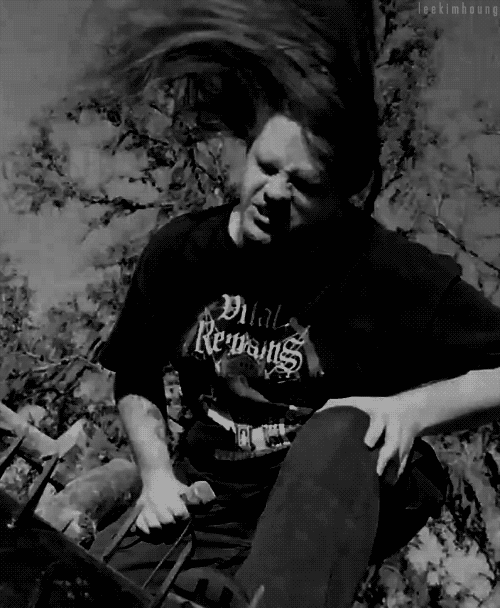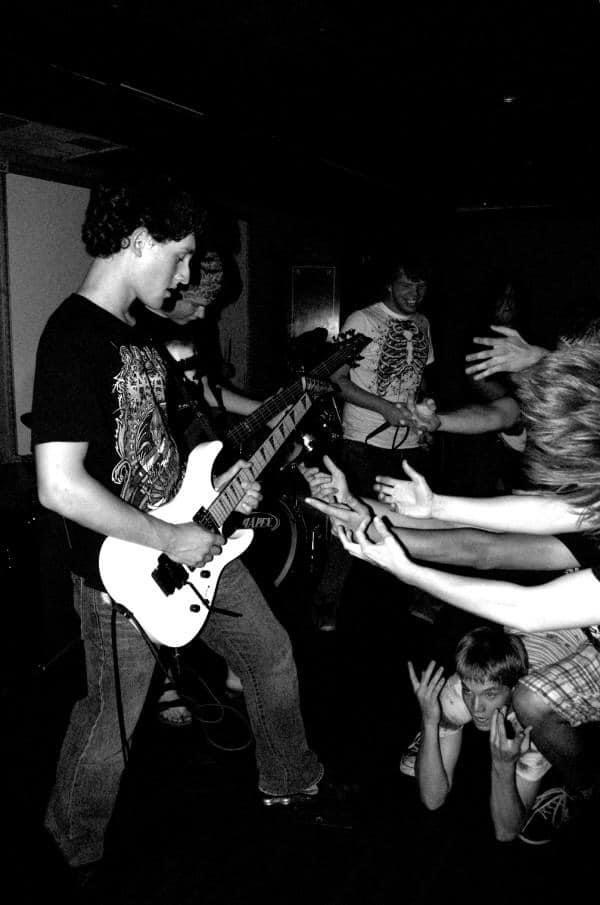From Humble Beginnings
Death metal has been one of my obsessions for the majority of my adult life. In 2007, middle school Joel found a video on a fledgling media worldwide website, Youtube. This video depicted a famous marching band scene from popular children’s cartoon Spongebob Squarepants. However, the audio had been replaced with a blistering track called "Knee Deep" from then upcoming extreme metal phenoms Job For A Cowboy. Seeing Spongebob's vocalizations synced up to the growling vocals, blast beat drum patterns, and chugging guitars was face peeling to me back then - face peeling in that I was laughing incessantly.
It was absolutely ridiculous. My buddies and I shared it around and watched countless times, laughing just as hard each time. But, unbeknownst to me, the deathcore (not technically death metal, but for the sake of brevity I am not going to split hairs right now) music in the video was growing on me quickly. I eventually kept returning to the video not for comedy, but for appreciation of the music.

But I was confused. Why did I like this music so much? I honestly could not describe my feelings for it. I couldn’t understand the lyrics at all, but the deep, grunting, mucousy vocals were captivating, if at times a bit unsettling. The drums were so fast they sounded like they were programmed by a computer.
Up until that point I had gotten into early heavy rock bands like KISS and AC/DC, sort of dabbled in what Slipknot were putting out, but they were still far from being proper death metal artists. This music also was not making me angry. Naive me associated extreme metal with angsty, grunting, long-haired, degenerate teenagers angry at the world. Why was this music making me feel...good?
To Decompose
Scientific American published an article reviewing a study that aimed to investigate that exact question. Music psychologist William Forde Thompson wondered “Why are people interested in music that seems to induce a negative emotion, when in everyday life we tend to avoid situations that will induce a negative emotion?” His findings were that death metal listeners often reported “feelings of empowerment, joy, peace and transcendence.”
Good to know young Joel was not alone in that.
‘“What we are finding is that they are not angry people. They’re not enjoying anger when they listen to the music, but they are in fact experiencing a range of positive emotions.’”
There is something to be said about the catharsis of extreme metal music. The ability to channel any and all emotions into one metaphorical location and moment - in a song. As I got older and my perspective, experiences, and worldviews matured, it became more and more obvious to me that the sheer aggression of death metal and extreme music gave me a place to express what anger I did have, and in a healthy manner. I wouldn't say that I am an outwardly angry person, but bottling up those emotions is not healthy. A death metal song is a three-and-a-half minute excursion into those intense emotions in the name of artistic expression. That exorcism gives way to contentment.
Does that explain the fixation on gore and killing that is stereotypically synonymous death metal?
Not...really....
But it's the same question as "Why do we like horror movies?" or "Why do people engorge themselves on podcasts about grisly serial murderers?" There are underlying cultural and psychological aspects to peoples' enjoyment of these genres that are perhaps not totally clear, but still undeniable, and not at all inherently immoral or malicious. Early death metal icons Cannibal Corpse claimed they wanted each song to be its own mini, self-contained horror film. Sometimes it's as profound as that.
Death metal, like many subgenres and niches in the music world, was born out of counterculture - an inherent need in its creators and purveyors to go against the grain and defy artistic and cultural traditions and preconceptions. Its roots can be traced back to mergers between the punk, hardcore, and thrash sectors of the music world and from that we got politically-charged, fist-pumping defiance out of it! It's not all blood and gore!
Lyrics centered around the global climate crisis and current mass extinction? Check. An album-spanning narrative about a shapeshifting alien race coming to earth and indoctrinating humanity - a gigantic sci-fi metaphor for colonialism and religious oppression? Check.
Sharing A Darkened Gospel
Of course there is the community aspect to it all. When I see someone walking down Mass. St. with a Soreption hoodie or Behemoth ball cap on, I immediately have a connection with that person that not many in the grand scheme share. As one of the psychologists referenced in the SA article states, "feeling like an outsider and an insider at the same time is at the core of the death metal experience."
Once you "get it" and you see other people who "get it" too, you cannot help but feel like you're in a special, unspoken club.
It is an often misunderstood art form, and this is without me gushing about the incredibly proficient musicianship required to write and perform it. And I think it should also be noted that extreme music doesn't solely serve as a utility for anger catharsis. The sun could be shining, I could have a full cup of coffee and be optimistic about starting such a lovely day and I STILL would want to crank some blast beats and chugging guitars. Unless I adhere to some sort of word count limit, I won't stop justifying this amazing genre.
Here are a few titles in our collection that are great to confide in, regardless of the status of the world and how much it may-or-may-not suck at any given moment:
The Anthropocene Extinction
Ruination
The Satanist
Jomsviking
To Drink From the Night Itself
-Joel Bonner is a Technology Assistant at Lawrence Public Library.




Add a comment to: Dark Music for Dark Times and Otherwise Happy People